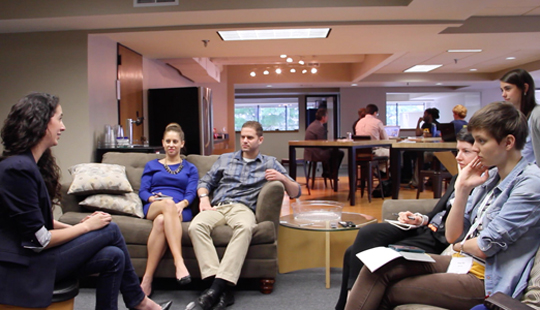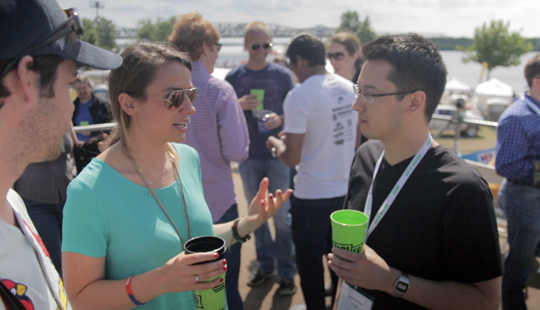Today, 10 more startup companies across the United States called on the FCC to reclassify the Internet and keep it free and open for innovation. While Congress has gone home for the August Recess, the process on Internet rulemaking continues at the FCC, where startup companies continue to make their voices heard. The companies, which represent a broad swath of growing businesses all across the country, once again focused on the only real choice available for Chairman Wheeler to preserve the ability for these companies to hatch, grow, and scale in the marketplace, and that is reclassification under Title II.
Take, for example, the story of San Francisco-based microfinance startup LendUp. Their story, according to co-founder Sasha Orloff in the filing, is only possible because the rules governing the Internet allowed for free and fair competition. As Orloff writes, “Competition within this industry is fierce and, if we were founded under the rules laid down in the Chairman’s proposal, our initial cost projections could have proven prohibitive. We would have needed to pay a substantial premium in order to ensure customers could find and access us within a crowded marketplace.” Instead, LendUp is now able to provide financial assistance to people in need, while also educating their customers about the positive benefits of responsible financial behavior, all because of technology they could build on an open Internet.
We get a bit of a global influence in this batch of comments as well, because despite Europe’s having recently fought -- and won -- its’ own battle for Net Neutrality, the FCC’s proposal could have deleterious effects on global companies doing business in the United States. Publitas, an Amsterdam-based company working to optimize and present digital content in the retail space, writes that not only would the company never have been gotten off the ground in the world envisioned by the current proposal, their future is under threat as well. U.S. influence on the Internet has global reach, and because of that, Publitas Founder and CEO Guillermo Sanchez warns that “[i]f the FCC had enacted policies which infringed upon net neutrality, the Netherlands might have enacted similar ones” which would have put the original idea under threat. But also, with a “data intensive” business like Publitas, “our business would be seriously hobbled if we were in a slow lane.”
The current proposal could also have negative influences on new marketplaces, writes Shapeways, a New York-based leading marketplace for 3D Printing images and blueprints. They are responsible for 18,000 Shapeways shops already, and with 3D Printing continuing its massive growth curve, the market they empower is continuing to foment further entrepreneurial gains in the economy on the whole. But that future is uncertain because of the proposal which Shapeways says, undermines “the great equalizer.” Everyone has the same access, anyone can float their own “crazy idea.” By creating two-tier access, you sacrifice this core tenet, throttle the spirit of freedom, and ultimately kill the power of wild innovation this nation is founded upon.” They lay out their proposed solution plainly, asking the FCC to reclassify the Internet as a utility, “which it is.”
These comments and more are available on our site, and we have again extracted multiple key quotes below. For more like this, sign up at startupsfornetneutrality.org and our work to reclassify the Internet continues over the course of the summer, we’ll keep you updated with all the news and views you need to help support a better proposal and a solution that keeps the Internet free and open for innovation.
-------------------------------------------------------------------
Distinc.tt
We currently spend considerable resources ensuring that our users can quickly access the content that they need. They view high-resolution photos of restaurants, events, and people; as well as geolocation data to help with coordination. They find out what places around them are most popular and who is currently there. These tools help LGBT people stay connected and maintain a sense of community in this rapidly changing environment. As you can imagine, the amount of bandwidth that this takes up is exponentially related to our growth and success. Having to negotiate with ISPs for the same access that our competitors would enjoy is simply not an option at our stage as a startup, we neither have the time nor the money.
Badger Maps, Inc.
There are a lot of costs to starting a business, and investors and venture capitalists are only interested in funding certain types of businesses. An entrepreneur needs to pay peoples' salaries, pay for servers, buy software, pay for space to house workers, buy Ramen and peanut butter, etc. So by adding another cost — paying off Internet service providers, to keep them from putting a gun to companies’ heads — you will get less innovation in the American economy.
LendUp
Beyond competition, core aspects of our business depend on Internet speed and efficiency. From underwriting to transaction processing, we rely on large amounts of data flowing quickly to meet customer needs and ensure accuracy and security. Speed also enables our value proposition as no customer is going to sit through a credit education video that takes too long to load. Again, with competition so intense and the alternative lenders so lacking our benefits, the consequences of a borrower abandoning us for a less compliant lender that could pay more for bandwidth are high. Furthermore, as investors evaluated the potential of our business, if these would-be risks had been a reality, I am confident conversations would have been different.
Linear Air
I am a serial networking entrepreneur and inventor. I have four Internet patents, and prior to Linear Air, I spent a decade as the CTO of a networking company (Ipanema Technologies) whose product was designed to guarantee good performance across the Internet. That makes me, as it happens, one of the world’s foremost technical experts on Internet performance, the matter at the heart of this proposal, and I can state definitively that the only way to create a “fast lane” on the Internet is to slow everything else down. Anyone who claims differently is either mistaken, or lying.
MobileWorks
We need strong network neutrality rules that keep the Internet as a level playing field. FCC Chairman Tom Wheeler should not preside over the transformation of the Internet from a level playing field that has been the greatest engine of innovation and growth the world has ever seen to being a discriminatory, heavily tolled platform controlled by an largely uncompetitive ISP industry. The Chairman’s proposal would allow ISPs to create new barriers to innovation that would harm startups like ours—and all those who may benefit for our services. It harms consumer choice, entrepreneurship, and will kill jobs.
Publitas
We need the protection of bright-line rules. We cannot make do with the FCC’s vague commercial reasonableness standard. We have no telecommunications lawyers on staff; big ISPs have hundreds at their disposal. We simply don’t have the resources to fight a legal battle on the basis of presumptions. We urge the FCC to enact bright-line rules which prohibit blocking, technical discrimination, paid prioritization, and access fees, applicable to both fixed and mobile connections, and to reclassify broadband providers under Title II of the Communications Act.
RebelMouse
The FCC’s proposal will parch the Internet ecosystem, constricting our revenues. It will also force us to pay whatever we must to put ourselves in the fast lane, and to negotiate individual deals with multiple ISPs. That is time and money that we could have spent on hiring, innovation, and growth. We also face the threat of exclusive deals, hammered out between our competitors and ISPs, giving them and them alone the right to a fast lane. We could not afford to purchase such a right, which undoubtedly would be very expensive. If any of our competitors bought the exclusive right to a fast lane, we might have to go out of business.
Shapeways
Over the past twenty years, American innovators have created countless Internet-based applications, content offerings, and services that are used around the world. These innovations have created enormous value for Internet users, fueled economic growth, and made our Internet companies global leaders. This innovation happened in a world without discrimination. An open Internet has also been a platform for free speech and opportunity for billions of users. Shapeways would not have come to life without the Internet, and the FCC’s proposal threatens our future to provide an open platform for independent businesses to flourish, even those with an inventory of one product. The proposal will further harm competition by quelling innovation among small businesses in all sectors by creating financial barriers to entry.
Fred Trotter
The Digital Divide is getting narrower but steeper, there are fewer on the ‘wrong’ side but life is getting worse and worse for those few. Our country is betting on digital health interventions working to rescue our economy but this model relies on consistent connectivity between consumer grade doctor ISP connections and consumer grade patient ISP connections. If we allow for the creation of Internet “fast lanes” we will force at least some patients and doctors into the slow lane. This will deepen the Digital Divide and significantly damage the healthcare reform efforts that are designed to rescue our country’s economy.
Poll Everywhere
Many of the concerns we would have had at our founding remain problematic today. We still run on a tight budget, and we’re not sure whether we could afford to put ourselves in a fast lane. Even if we could, that would only mean diverting money away from hiring and growth.
Meanwhile, we are terrified by the threat of an exclusive deal, forged between ISPs and a giant producer of clickers. We certainly could not afford such a deal, which would come at a great cost. If that deal forced us to the slow lane, it would be hard for us to draw in new users. We might even lose our current ones, frustrated as they would be with our slow and patchy service.






















